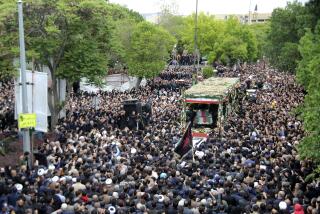Iran’s opposition calls for more protests
- Share via
Reporting from New York — Iran’s beleaguered opposition movement, under enormous government pressure but encouraged by popular uprisings throughout the Middle East, is calling for another round of protests Sunday, raising the stakes in its confrontation with Tehran’s hard-line Islamist government.
A statement posted Thursday to the website of former prime minister and 2009 presidential candidate Mir Hossein Mousavi called on Iranians to take part in memorial services to mark the religiously significant seventh day after the deaths of two Iranians during raucous Feb. 14 opposition protests in Tehran and other cities.
The scope and magnitude of those demonstrations, inspired by the uprisings that overthrew Tunisian president Zine el Abidine ben Ali and Hosni Mubarak of Egypt, appeared to catch security forces and even demonstrators by surprise. They were the largest public displays against Iran’s authoritarian system since a similarly scattered and violent December 2009 day of unrest that followed the disputed reelection of President Mahmoud Ahmadinejad.
In response to the Feb. 14 protests, Iranian lawmakers have called for the deaths of Mousavi and opposition leader Mehdi Karroubi. The two had supported the rallies in an attempt to build on the demands for change rippling across the Middle East to reignite the so-called “green movement,” the loosely organized opposition front that sprang from the disputed 2009 election.
Similar to 2009, the current incarnation of the political feud between Iran’s moderate reformers and hardliners is turning into a competition for the streets. Iranian authorities have announced their own Friday rally to express “hatred” for the opposition movement.
“The noble people of Tehran will take to Revolution Square after Friday prayers with their solid and informed presence,” said the Islamic Propagation Coordination Council, which organizes pro-government rallies, according to the official Islamic Republic News Agency, or IRNA. Those joining the rally will “scream out their hatred, wrath and disgust against the savage crimes and evil movements of the sedition leaders, the [exiled Mujahadein Khlaq Organization] and their monarchist allies.”
Iran’s official media often refers to Mousavi and Karroubi as leaders of the sedition, a religiously loaded accusation of treachery punishable by death under Islamic law. Some Iranian authorities are urging fellow hardliners to remain cautious.
“We call for restraint and letting the judiciary branch decide about leaders of sedition according to prudence and expedience of the country and government,” judiciary chief Sadegh Larijani told a group of judges Thursday, according to IRNA.
Iran’s Supreme Leader Ali Khamenei originally hailed the uprisings rattling U.S.-backed governments in the Arab world as an “Islamic awakening” similar to the late 1970s revolution that brought the religiously conservative Shiite Muslim clergy to power in Tehran, the capital. But Iranian authorities are now watching nervously as the demands for change echoing across the region sound within their own borders.
The official rally on Friday is likely to be huge. It remains unclear how many will risk turning out for the opposition protests on Sunday. Security forces clamped down brutally against protesters at Monday’s scattered but widespread protests. Arrests of activists and heavy deployment of security forces followed.
Clashes erupted between government supporters and opposition activists during the funeral service for art student Sanee Zhaleh, who was killed Monday.
Zhaleh was a member of Iran’s long-restive Kurdish minority. Iranian authorities insist he was a government supporter killed by protesters, an accusation his friends and family have rejected in interviews with international media. The statement posted to Mousavi’s website said protesters presence in the streets on Sunday would “show solidarity with our Kurdish compatriots and honor the two dear Iranians whose blood was spilled in the struggle against religious dictatorship.”
More to Read
Sign up for Essential California
The most important California stories and recommendations in your inbox every morning.
You may occasionally receive promotional content from the Los Angeles Times.










